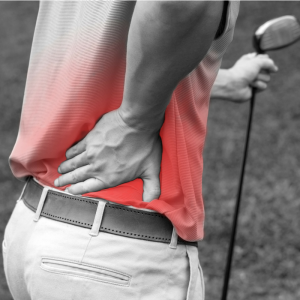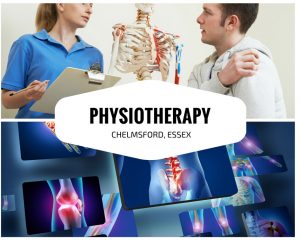Do you play Golf? Are you passionate about it? No matter what, you do not want to quit?
But what about the injuries related to Golf that you need to face while
playing. What do you do? Where do you go? How do you deal with it?
Learn how Faye Pattison Physiotherapy helps Golfers like you deal with the
pain and injuries after coming of the course.
First, let’s get into some of the common injuries related to golf.
5 Common Golf Injuries
1. Tennis Elbow and Golfers Elbow
Muscles and tendons in our arms connect the writs and forearm to the Elbow
which allows us to perform a flexion and extension movement at the wrist
and elbow joints.
However, if we flex and extend repetitively (as in when we play Golf), the
end part of our elbow gets inflamed and injured. If inflammation is on the
medial side (inside), it is known as Golfer’s elbow, which occurs due to
flexion of wrist and elbow. If the inflammation is on the lateral side
(outside), it is known as Tennis Elbow, which occurs due to the extension of
wrist and elbow. However these pains are not just limited to playing golf or
tennis! We all use our bodies every day and perform the same movement over
and over so we could just say this is a repetitive strain disorder but
Golfers Elbow / Tennis Elbow sounds more fun!
2. Shoulder Pain
While swinging, your shoulder muscles contract and rotate and the shoulder joint gets into
action. With that movement, micro tears occur to rotator cuff tendons,
impingements can occur with the nerves and other structures, A-C joint can
get destructed and arthritis can form all which leads to a painful shoulder.
TO READ MORE ON ARTHRITIS CLICK HERE
3. Back Pain
If you often play Golf, then you are most likely to suffer from back pain as
well.
Your back has to rotate to swing and hit the ball with your club. That
action stretches the back muscles and ligaments, and often destroys the
alignment of the backbones to each other and leads to Back Pain.
Also, I like to add, as it gets all my patients thinking; that when do you ever rotate in the opposite direction?
You don’t right?

We are either left or right handed players so only ever rotate
the same way! Our muscle memory begins to adapt to only rotating this way and our fascial network can get all out of sorts, tight and not function correctly therefore
overtime, have a rotational pulling force on our bodies even when NOT PLAYING GOLF which can affect other daily activities due to incorrect biomechanics, thus lead to further
problems.
4. Wrist Tendinitis
While playing golf, your wrist is involved a lot, to hold the club, to swing
and to carry the bags (unless your fortunate enough to have a caddy) and
this is before the post game drinks in the clubhouse!
While performing those activities, your muscles are always on the go making
a combination of powerful and minute movements frequently; which often leads
to inflammation of the tendons on our wrist.
5. Knee pain
Prolonged standing, repetitive squatting, and walking put pressure and
tension on the knee as well. The surrounding tissues of the knee, the knee
joints, and patella tendon gets repetitive micro-injury leading to
Tendonitis, Arthritis, and Tears. And in the long run, it causes extreme
knee pain.
Have you ever considered how your foot biomechanics could be effecting you
knee on the golf course? With our bespoke, custom made Golf orthotics, you
can be assured your feet are in the correct biomechanical position for all
those miles you walk on the course each week.
Faye Pattison Physiotherapy Interventions for Golf Injuries
If you are a passionate Golf Player in and around Chelmsford, Essex, the following is
what you need to know about our services at our clinic. Both our Soft Tissue
Therapists and Physiotherapists are passionate about sport and helping all
different levels of players.
We will help to deal with Golf Injuries in three phase.
1. Prevention Phase
In this phase, we work out how to help prevent Golf injuries.
a) Posture Training
The most important and baseline to prevent injury is correct posture to
perform the task. Our experienced Physiotherapist will assess how you are
maintaining posture while playing Golf. Then we correct it and train the
core muscles that work to maintain posture.
b) Muscle Strengthening
Strong muscles are difficult to get a tear, and it provides a good support
to other soft tissues and joints. I don’t mean to go to the bodybuilding
Gym, build bulky muscles and go play Golf!!
Our Physiotherapists are well trained and have good knowledge of which
muscles are involved when playing Golf. Accordingly, we work out to
strengthen the core muscles involved to prevent Golf related injuries.
c) Support and Braces
Support with tape is also key to helping with your recovery. it reinforces
the muscles and ligaments to prevent further injury. A brace can be worn in
extreme cases.
2. Treatment Phase
Despite a tremendous effort, we put in preventing any injury, we do
sometimes get injured. But no worries, in this phase we work on to reduce
pain, inflammation, and swelling.
A Few treatments that we provide at Faye Pattison Physiotherapy are as
follows.
a) Manual therapy
Soft Tissue therapists, massage therapists and physiotherapists can all play
an important role in the treatment of your injury by targeted hands on
treatment to help get rid of your pain.
b) Stretching exercises
Pain is sometimes caused due to tight muscles. You need to stretch those
tight muscles; it helps to get rid of the muscles, and also it helps you to
enhance your performance.
c) Soft Tissue Manipulation
A Deep tissue massage is very helpful to relax the tensed muscles, soften the soft
tissues and gain the elasticity of the tissues. It also increases the
circulation in our body. All of it is important to get rid of your pain and
treat your injured tissues.
CLICK HERE TO READ OUR BLOG: BENEFITS OF A DEEP TISSUE MASSAGE
3. Rehabilitation Phase
In the final phase, it is to speed up the healing process and get your
injured tissues to get better asap so you can get on and enjoy playing Golf
as soon as possible. In this phase, we work to strengthen the weakened
muscles from injury, gain the elasticity of the tissues and be able to move
like you use to. Along with giving you advice and tips for your future
rounds of golf.

Whether you are a regular player or occasional player, injuries can occur to
anyone and anytime.
But don’t let the pain and injuries stop you from playing the game you are
so passionate about.
Book an initial consultation with a Soft Tissue Therapist, physiotherapist
or sports massage for a consultation on how our team can help treat, rehab
and prevent the injury, so that you can have a pain-free golfing life!






